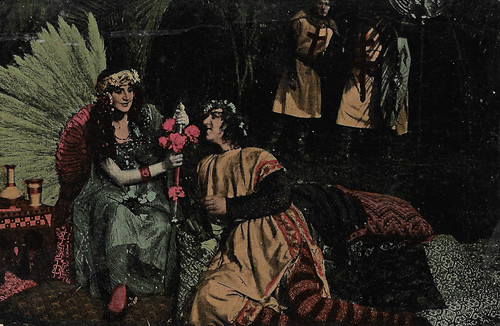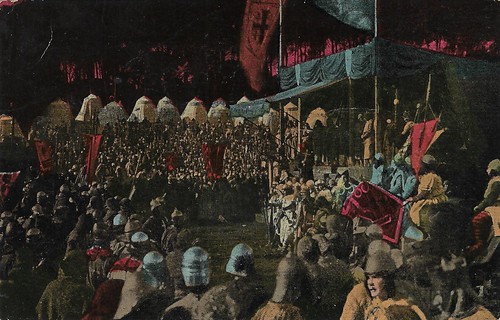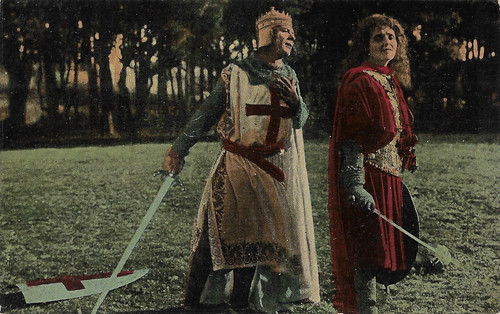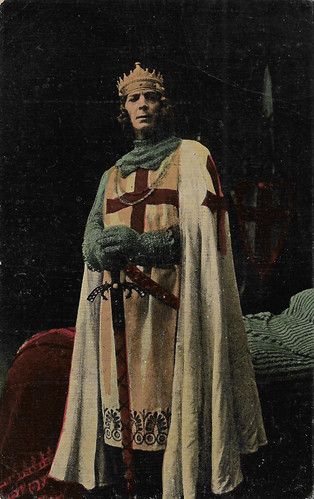
Spanish collectors card by Chocolat Imperiale, Cromo no. 1 of 6. Photo: Exclusiva José Montañola/Guazzoni Film. Edy Darclea as Armida and Beppo Corradi as Rinaldo in the La Gerusalemme liberata (Enrico Guazzoni, 1918). Spanish title: Jerusalén Libertada.

Spanish collectors card by Chocolat Imperiale, Cromo no. 2 of 6. The attack on Jerusalem in La Gerusalemme liberata (Enrico Guazzoni, 1918).

Spanish collectors card by Chocolat Imperiale, Cromo no. 3 of 6. The crusaders' camp in La Gerusalemme liberata (Enrico Guazzoni, 1918).
The battle of Jerusalem
In 1096, Godfrey of Bouillon (Eduardo Monteneve) heads a crusade against the Turks and Aladin (Ljubomir Stanojevick), the cruel king of Jerusalem. His captains are Tancredi from Taranto and Rinaldo from Este. Aladin appoints Clorinda (Olga Benetti), an intrepid Persian, to head the troupes defending the city, together with the valiant Argante (Aristide Garbini).
After having saved the lives of Olindo (Rinaldo Rinaldi) and Sofronia, two young Christians condemned to death by the ruthless Aladdin for stealing a sacred image from the mosque, Clorinda fights a duel with Tancredi (Amleto Novelli), one of Godfrey's captains. He has fallen in love with her but doesn't want to fight her on the battlefield. Because of her armor and the darkness, he is ignorant of who his adversary is. So, he kills his beloved, who converts to Christianity while dying.
Meanwhile, the beautiful magician Armida (Edy Darclea) has enchanted Rinaldo (Beppo Corradi), another crusader, who has fallen in love with her, in her magical garden. Once he re-awakes from the spell, despite the pleas of Armida, he returns to the Christian camp to participate in the assault of Jerusalem, which is conquered after a long and strenuous battle.
The British film journal The Bioscope wrote in 1919 that Gerusalemme liberata confirmed Enrico Guazzoni's talent after his Quo vadis?. The Bioscope considered Guazzoni the master of the revocation of such famous historical events, even more than D. W. Griffith. While most attention went to the mass scenes, individual praise was for Novelli and Benetti. The triumphant entry into Jerusalem was equaled by the victorious entry of the Allies, 800 years after.
In 1911 Guazzoni already had made an earlier version, again with Amleto Novelli in the lead as Tancredi, but this time also with Gianna Terribili Gonzales as Clorinda, instead of Olga Benetti; with Emilio Ghione as Rinaldo, and Fernanda Negri-Pouget as Armida. Wikipedia mixes up these two versions and mistakes its production year. The 1911 version was well-received, nationally and internationally, and considered the second Italian 'feat' after La caduta di Troia/The Fall of Troy (Giovanni Pastrone, 1911), the first two-reeler epic film.

Spanish collectors card by Chocolat Imperiale, Cromo no. 4 of 6. Amleto Novelli as Tancredi and Olga Benetti as Clorinda in La Gerusalemme liberata (Enrico Guazzoni, 1918).

Spanish collectors card by Chocolat Imperiale, Cromo no. 5 of 6. Amleto Novelli as Tancredi in La Gerusalemme liberata (Enrico Guazzoni, 1918).

Spanish collectors card by Chocolat Imperiale, Cromo no. 6 of 6. Amleto Novelli as Tancredi and Olga Benetti as Clorinda in La Gerusalemme liberata (Enrico Guazzoni, 1918).
Source: Vittorio Martinelli (Il cinema muto italiano, Vol. 1918 (1991), and Vol. 1911, I (1995)), Wikipedia and IMDb.
No comments:
Post a Comment